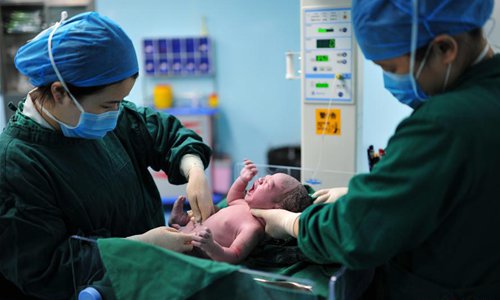New five-year plan signals trend of 'lifting family planning'
By Cao Siqi and Cui Fandi Source: Global Times Published: 2020/11/4 21:03:41
Minority groups expected to be granted same rights under 'inclusive' policy: demographers

Photo:Xinhua
Chinese demographers believe lifting family planning will be a trend in the country's population policy, and minority groups, including unmarried women and same-sex couples, are expected to be granted the same rights to raise children.
Heated discussion came after the new five-year plan proposal, which was released on Tuesday. It scrapped the rhetoric of "family planning" in the previous five-year plans, while putting forth the concept of "inclusiveness" in fertility policy for the first time, which ignited wide curiosity about its implications.
The proposal of the 14th Five-Year Plan (2021-25) for National Economic and Social Development urges the country to implement a national strategy for actively responding to the aging population.
It requires the formulation of a long-term population development strategy, as well as optimizing fertility policy, making the policy more inclusive, reducing the cost of childbearing and education, and promoting population quality.
The 13th Five-Year Plan (2016-20) stressed adherence to the basic national policy of "family planning" but the rhetoric has been deleted in the new plan, which demographers agreed that lifting birth restrictions will definitely be the future trend.
"It signals that the country will continue relaxing its policy on birth restrictions," Liu Zhijun, a deputy head of the Social Science Experiment Center of Zhejiang University, told the Global Times on Wednesday.
"Birth restrictions will definitely be phased out. We are moving in the right direction," said Zhai Zhenwu, chairman of the standing council of the China Population Association under the National Health and Family Planning Commission.
The number of births in China has fallen each year since 2017. Due to the weakening effect of the second-child policy and a decrease in the number of women of childbearing age, it is highly possible that the number of new babies will decline again in 2020, He Yafu, an independent demographer based in South China's Guangdong Province, told the Global Times on Wednesday.
He's prediction is confirmed by data released by health commissions in some cities. For example, data from Ningbo's Health Commission in East China's Zhejiang Province shows 17,945 births were registered in the first half of this year, a year-on-year decrease of 19.24 percent. Data from Huangshan's Health Commission in East China's Anhui Province shows 6,766 people were born in the city in the first seven months of 2020, down 16.88 percent from the same period last year.
"During the 14th Five-Year Plan period, the number of women of childbearing age will continue to decrease, by about 4.5 million per year on average. If the fertility rate cannot be properly increased, the number of births will decrease year by year during the period," said He, suggesting a third-child policy could be implemented in the new five-year plan period.
But other demographers are cautious about whether the policy will be relaxed so soon.
"The adjustment and improvement of the fertility policy is an important part of the national strategy to deal with the aging population, but how the policy can be adjusted during the next five years, and whether to implement the third-child policy, or even to completely lift the restriction, remains unclear," said Lu Jiehua, a professor of sociology at Peking University.
Demographers also pointed out that another highlight in the new plan is the "inclusiveness" of fertility policy.
Last November, the decision of the fourth Plenary Session of the 19th Communist Party of China Central Committee called for "optimizing the fertility policy and improving the population quality." A year later, the phrase "enhancing the inclusiveness of fertility policy" appeared for the first time in the new five-year plan proposal.
Zhai said that "inclusiveness" is not just about the number of babies. It could mean minority groups including unmarried women having children, or that same-sex couples who wish to have children, are likely to encounter fewer restrictions in the future.
"Unmarried women's wishes and rights to become mothers should be respected and guaranteed. Likewise, same-sex couples," Liu from Zhejiang University said.
Yi Fuxian, a research fellow at the University of Wisconsin-Madison, said inclusiveness means that babies who were born in violation of the family planning policy may not be held accountable.
Despite scrapping the one-child policy in 2015, China still imposes penalties on anyone caught breaking the rules, which is called a "social maintenance fee."
Since the implementation of the second-child policy in 2016, 30 provinces have revised their family planning regulations, and more than 20 of them have clarified the standards for collecting social maintenance fees. Amid demand from the public, experts and political advisors to cancel the fees, it seems China still has no plans to stop levying social maintenance fees, though some cities have reduced the size of the fines substantially since 2018.
Some people said they were free from paying the fees because there aren't any family-planning offices in their community management office.
Experts believe that inclusiveness also means building a more birth-friendly environment in society, such as reducing the cost of childcare, establishment of more childcare centers and tax relief for couples having children.
Although Chinese demographers have not reached a consensus on how to adjust the fertility policy, they expressed their anticipation for 2021, believing that it will be a turning point with the new five-year plan expected to bring more favorable measures to safeguard people's right to give birth.
Newspaper headline: New signal of 'lifting family planning'
RELATED ARTICLES: